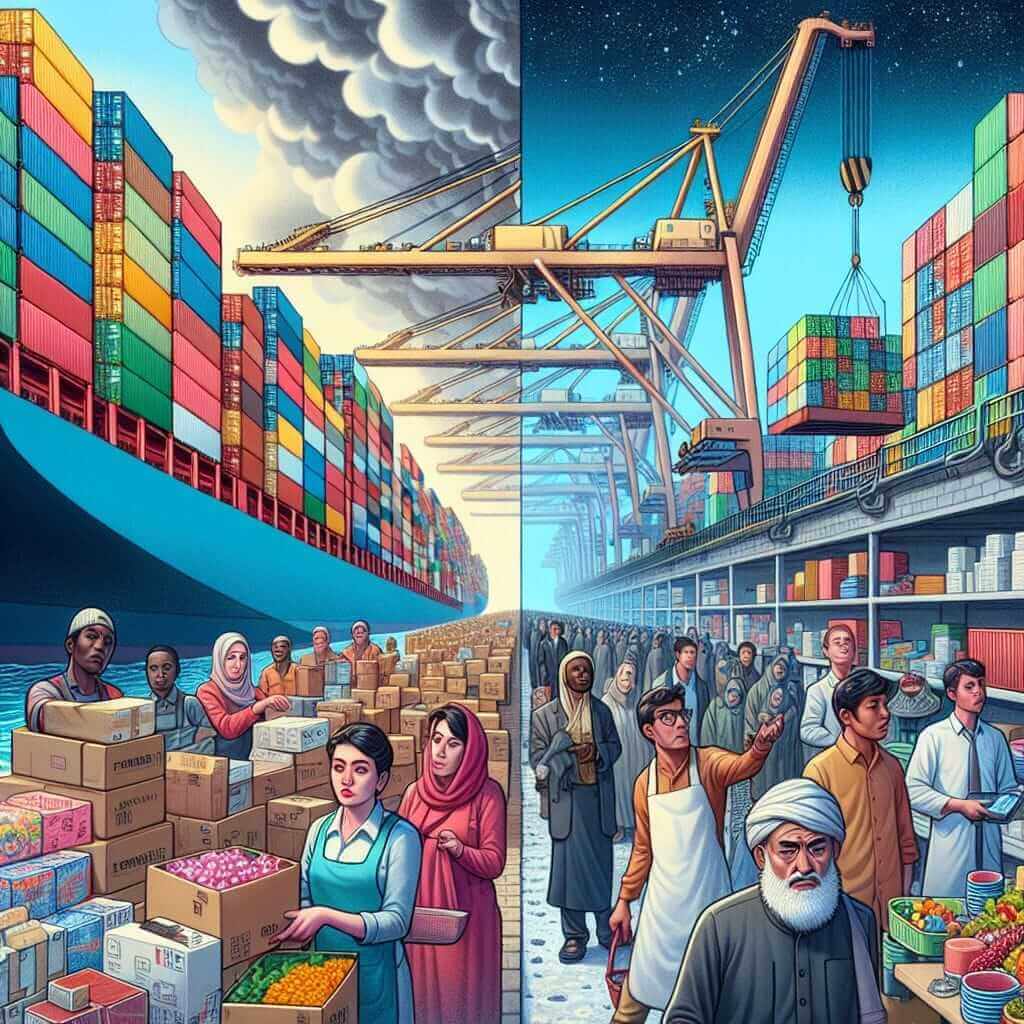The impact of global trade on local industries is a hot topic in the IELTS exam. It falls under the broader categories of globalization, economics, and international relations. You might see this topic phrased in various ways, including:
Possible IELTS Writing Task 2 Questions:
- To what extent do the benefits of global trade outweigh the drawbacks for local industries?
- Global trade often leads to the closure of local businesses. What are the reasons for this, and what can be done to support local industries?
- Some people argue that global trade has a negative impact on local cultures. Do you agree or disagree?
Sample Essay: Global Trade and Local Businesses
Let’s choose the second question for our sample essay:
Global trade often leads to the closure of local businesses. What are the reasons for this, and what can be done to support local industries?
Analysis
This question requires you to:
- Identify reasons why global trade can harm local businesses.
- Suggest solutions to mitigate these negative effects.
- Present a balanced view, acknowledging the complexities of the issue.
Essay Response
Global trade, while offering undeniable benefits to the world economy, can pose significant challenges for local businesses, often leading to their closure. This essay will explore the primary reasons behind this phenomenon and propose potential solutions to support local industries in the face of global competition.
One major reason local businesses struggle against global competitors is the price disparity. Large multinational corporations, benefiting from economies of scale and often lower production costs in developing countries, can offer goods and services at significantly reduced prices. This price competitiveness makes it difficult for local businesses, especially small and medium-sized enterprises (SMEs), to compete, leading to reduced market share and, in some cases, closure.

Furthermore, global trade can lead to a flood of standardized products, often overshadowing unique, locally-produced goods. This can be particularly detrimental to traditional crafts and industries deeply rooted in local culture and heritage. The allure of cheaper, mass-produced items can erode consumer demand for specialized local products, threatening the survival of these businesses.
However, several measures can be taken to support local industries. Governments can implement policies that provide a more level playing field. This could include offering tax breaks and subsidies to local businesses, particularly SMEs, to enhance their competitiveness. Additionally, promoting fair trade practices and ensuring responsible sourcing can help level the playing field while promoting ethical business practices.
Moreover, fostering a sense of community and encouraging consumer awareness about the value of supporting local businesses can be highly impactful. Campaigns promoting the uniqueness, quality, and cultural significance of locally-produced goods can sway consumer choices towards local businesses. Supporting local farmers’ markets, craft fairs, and independent retailers can also contribute significantly to their sustainability.
In conclusion, while global trade undeniably presents challenges for local businesses, a multi-faceted approach encompassing government support, fair trade practices, and a renewed focus on community engagement can help mitigate the risks and empower local industries to thrive. By valuing and supporting the unique contributions of local businesses, we can foster a more diverse and resilient economy. (Word count: 325)
Writing Tips
- Use clear topic sentences: Each paragraph should begin with a sentence that clearly indicates the main point.
- Provide specific examples: Where possible, illustrate your points with real-world examples.
- Use linking words: Words like “furthermore,” “however,” and “in conclusion” help guide the reader through your argument.
- Academic language: Maintain a formal tone and use vocabulary appropriate for an academic essay.
Vocabulary
Here are some advanced words from the essay:
- Disparity (noun /dɪˈspær.ə.ti/): A great or noticeable difference between two things.
- Multinational Corporations (noun /ˌmʌl.tiˈnæʃ.ən.əl ˌkɔː.pərˈeɪ.ʃən/): A large company that produces or sells goods or services in various countries.
- Economies of scale (noun /ɪˈkɒn.ə.miz əv ˈskeɪl/): The reduction in the cost of producing something when it is produced in large quantities.
- Standardized (adjective /ˈstæn.dəd.aɪzd/): Made to be the same everywhere.
- Subsidies (noun /ˈsʌb.sɪ.diz/): Money given by a government to an industry to keep the price of goods low.
Conclusion
Mastering the topic of global trade and its impact on local industries will equip you to tackle a range of related IELTS Writing Task 2 questions. Remember to practice regularly, analyze your strengths and weaknesses, and continue expanding your vocabulary to achieve your desired band score.
Other potential IELTS essay topics related to this theme:
- The role of government in protecting local industries in the era of globalization.
- The impact of e-commerce on local businesses and consumer behavior.
- The importance of promoting cultural diversity in the face of globalization.